BME BIO: Nicolas Acosta, Andy Garcia, Juan Rodriguez
In honor of National Hispanic Heritage / Latinx Heritage month, get to know our exceptional BME faculty, students, staff, and alumni.
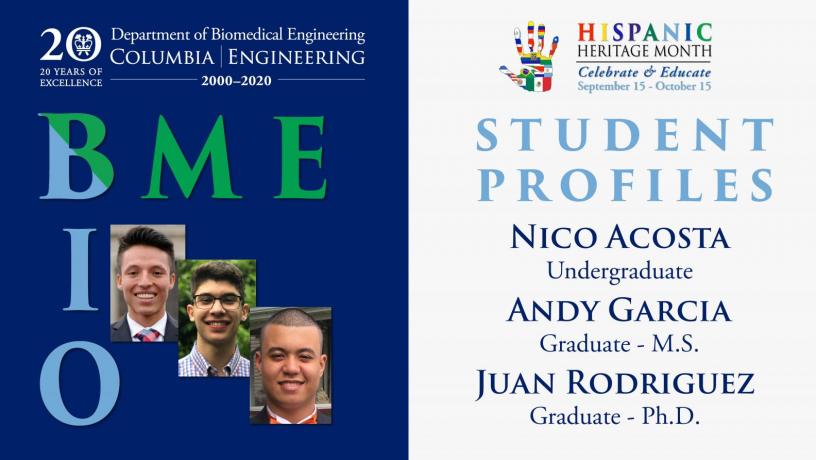
NICOLAS ACOSTA - Undergraduate Student
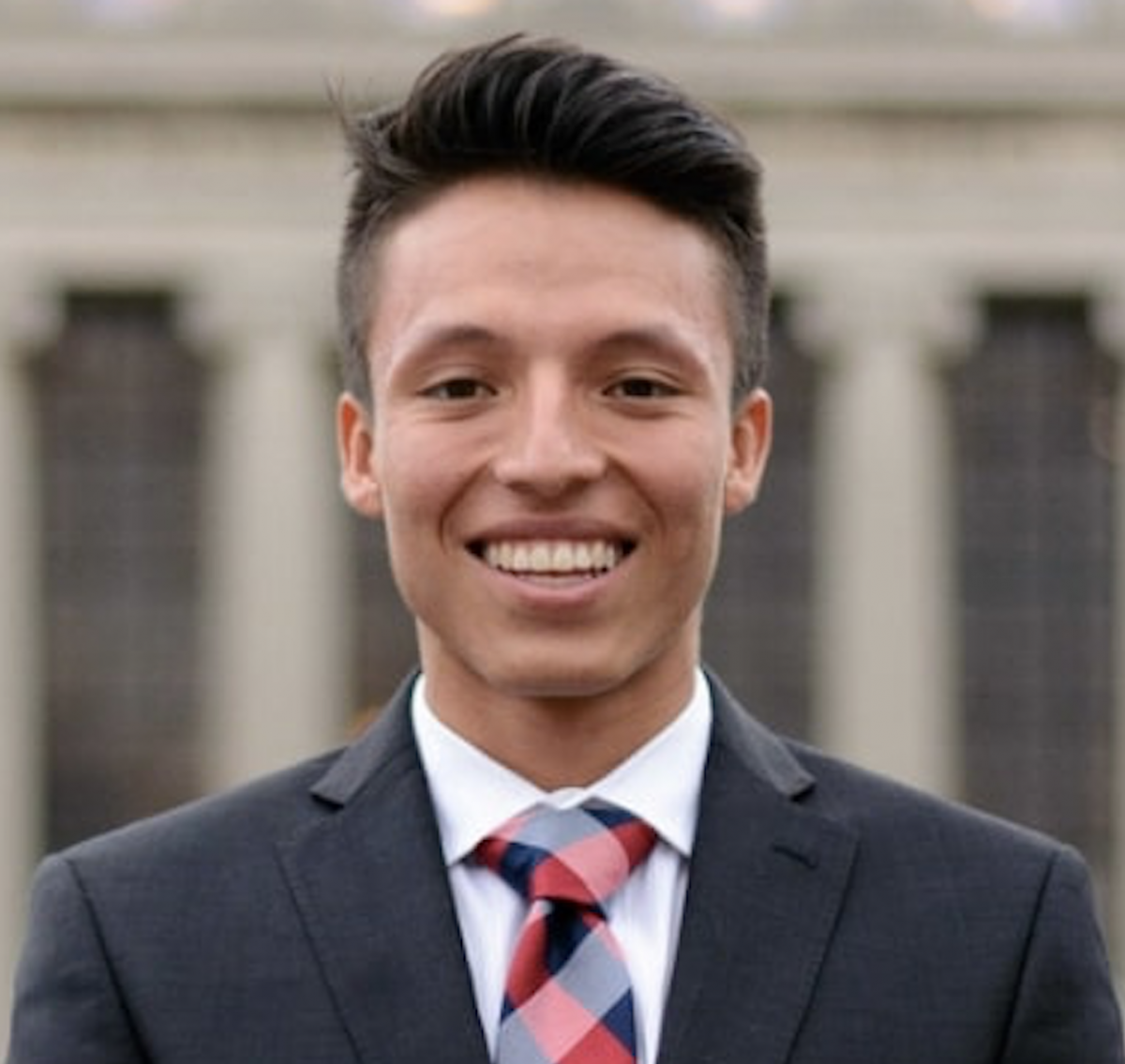
Nicolas Acosta
Noteworthy Achievements
QuestBridge Scholar 2017
Columbia University Design Challenge Winner 2017
Roy Pollack Scholar 2020
Where are you from?
I was born in Bogotá, Colombia and lived there for the first four years of my life. I then moved to Suffern, New York where I have lived with my family for the past 17 years.
What is your current position?
I am currently a senior undergraduate student majoring in Biomedical Engineering. In addition to being a student, I am an undergraduate researcher in the Sia Lab at CUIMC.
How did you become interested in engineering and, more specifically, in biomedical engineering?
From a young age, I always wanted to be a doctor since it was a profession where I could apply my love for science and also help others in need. My parents also supported this idea as it would allow me to establish myself as a professional in this country with financial stability. However, as I progressed in my education, I found that what interested me lied in the mechanisms by which things worked, particularly understanding the methods by which technology and biology intersected. Thus, still having my desire to help others, I chose Biomedical Engineering due to its incredible interdisciplinary nature and its direct impact on human health.
Tell us about your family. Who has/have been your strongest influence(s) in life?
I believe a large part of who I am today is due to the family I was raised in. Both my mom and my dad exemplified diligence and determination since the moment we set foot here in the US. We only had each other and so our unity gave us strength during the first couple of uncertain years since our arrival. My mom a housemaid, and my dad a construction worker, both worked strenuous jobs in order to provide our family with stability. Seeing my parents come home from work exhausted and battered instilled in me a sense of perseverance, I needed to work hard to overcome the obstacles in front of me and validate my parents’ sacrifices. Their tenacity and dedication inspires me to always work hard towards my goals and strive for a brighter future. Without their love and support, I would not be the person I am today.
How has your Latinx background influenced your experience as an academic professional in STEM?
There are not that many Latinx students in BME or in most STEM majors for that matter, so forming a sense of community with other Latinx students within the STEM fields is rather difficult. However, through other organizations like the Society of Hispanic Professional Engineers, I was able to meet other incredible engineers with similar backgrounds and discuss issues that Latinx engineers go through. While forming a sense of community is definitely important for me as a person, I see my participation in this field necessary to improve representation within STEM. By graduating with a STEM degree, I am able promote the presence of diverse groups within these spaces and show younger members of our community that a career in STEM is possible.
What accomplishment(s) are you most proud of, and what do you hope to accomplish in the future?
Truthfully, I feel like being here at Columbia University is my greatest accomplishment so far. When I was stepping off the airplane 17 years ago, I would never have imagined that I would end up attending one of the most prestigious universities in America. By being a part of Columbia University, I was able to show that despite my immigrant status, I could face the unfortunate circumstances in my life and with the support of my community pursue an undergraduate degree in Biomedical Engineering. After I graduate, I plan to pursue a PhD in Biomedical/Biological Engineering, focusing on lab on a chip technologies and point of care diagnostics.
What advice would you give to others who wish to pursue a degree and/or career in BME?
Research is definitely something most undergraduates should explore. I realize that it may be daunting to start in a lab as a freshman due to the knowledge gap that you may perceive is present, but truthfully, research is meant to be the process by which you bridge this gap. Your lab will provide you with the opportunity to learn valuable skills and foundational knowledge in your area of interest, so I highly recommend getting started as soon as you can. Even if you do not plan on going into academia, research positions are amazing ways to indulge in any intellectual curiosities and make you a more appealing candidate for any position for which you are applying!
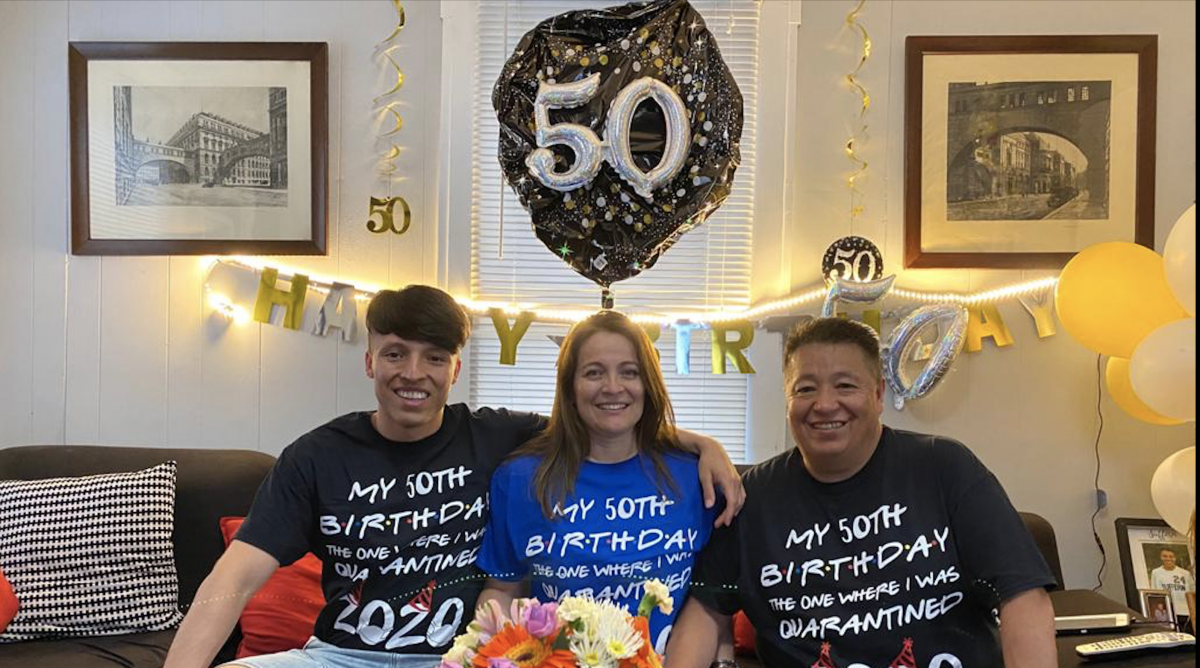
Here is my family celebrating my Mom’s 50th birthday during the pandemic!
(Pictured from left to right: Nico, Linda, Armando)
ANDY GARCIA - Master's Student
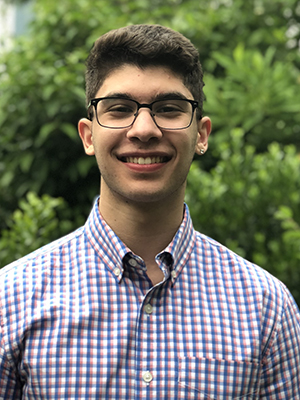
Andy Garcia
Noteworthy Achievements
Finalist, South by Southwest (SXSW) Student Innovation Awards
First Prize Overall, NYC Media Lab Summit
Where are you from?
I was born in Manhattan but was raised on Long Island.
What is your current position?
I am a graduate student at Columbia University.
How did you become interested in engineering and, more specifically, in biomedical engineering?
I, like many who become engineers, was an inquisitive kid. I loved to take things apart and figure out how they worked (often against my parents’ wishes) and was captivated by shows like Mythbusters, as cliché as it may sound. When it was time to go to college, I decided to study mechanical engineering. It was during my undergraduate studies at NYU where I fostered a passion for biomedical engineering. There, I participated in a number of research projects that exposed me to the potential for mechanical engineering to impact patients in healthcare settings, driving me to pursue a Master’s degree in biomedical engineering.
Tell us about your family. Who has/have been your strongest influence(s) in life?
My father was a paramedic in Lower Manhattan for his whole career and was a first responder during 9/11. I have long admired his dedication to serving the communities of NYC as he saved countless lives on the front-line. He has instilled many of the values that I hold today, and those that have drawn me to biomedical engineering. He dedicated his life to protecting and improving the health of those in our community and I hope to follow in his footsteps, utilizing math and science to affect change on a larger scale.
How has your Hispanic background influenced your experience as an academic professional in STEM?
As a Hispanic academic in STEM, I have been forced to face the jarring inequities present in academia, healthcare, and beyond. The sacrifices that my father has had to make to support me throughout college motivate me to work hard to ensure that his efforts were not made in vain. When working with Hispanic patients on projects, being a Hispanic in STEM helps me to empathize and develop better solutions to address their needs, both medical and financial. I will carry this perspective with me throughout my career as I work to advance science and medicine, ensuring that medical innovations are accessible to all.
What accomplishment(s) are you most proud of, and what do you hope to accomplish in the future?
I am most proud of my work on the MakerBrace, an undergraduate project that I eventually went on to lead at NYU. We realized that low-income families could not afford the expensive braces needed for their children with cerebral palsy. Because children grow rapidly and must often be refitted for these braces, insurance companies don’t cover the costs, meaning that many children grow-up without access to braces that are critical to rehabilitation. To solve this, we’ve developed a 3D-printed brace that can be quickly resized to ‘grow’ with a patient, and is most importantly, low-cost. It has been heartening to work with our patients, improving their ability to complete activities of daily living, while providing a way for their families to spend 95% less on each brace. This work has motivated me to continue similar work at Columbia, combining translational research with the development of novel biomedical innovations to address the needs of low-income communities in NYC and beyond.
What advice would you give to others who wish to pursue a degree and/or career in BME?
Network! As a Hispanic, low-income, or first-gen student, we often underestimate the power of networking. It could be intimidating at first but reaching out and making sure others know who you are will open doors for your next opportunity. There’s always something to learn from each connection you make, and you never know who can introduce you to your next employer.
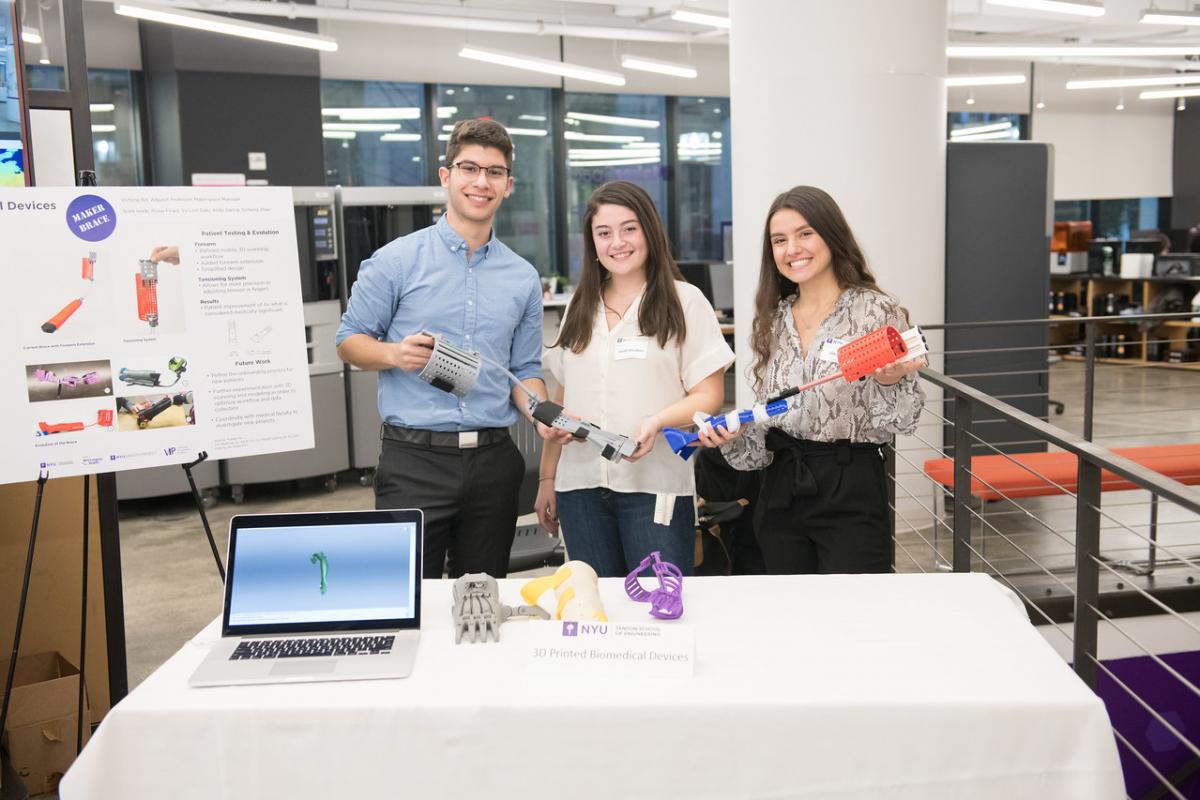
Presenting the MakerBrace at a Research Exposition with Other Members of the MakerBrace Team
(Pictured left to right: Andy Garcia, Sarah Mesdour, and Odeta Kurti)
JUAN RODRIGUEZ - PhD Candidate
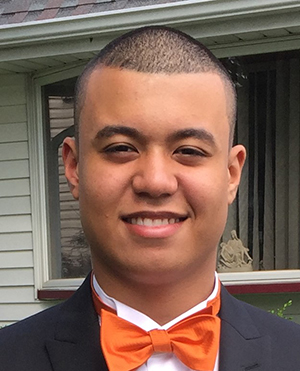
Juan Rodriguez
Noteworthy Achievements
Graduated Cum Laude
Winner of NIH VentureWell Venture Prize
Where are you from?
I was born in New York City, but grew up in Teaneck, New Jersey. My family is from the Dominican Republic.
What is your current position?
I am a first year MS/PhD student working in the Hess Lab focusing on Nanobiotechnology.
How did you become interested in engineering and, more specifically, in biomedical engineering?
I have always been interested in math and science growing up and really gravitated towards physics and biology. I saw biomedical engineering as a great combination of the two and I always wanted to pursue something that could make a positive impact in society.
Tell us about your family. Who has/have been your strongest influence(s) in life?
My parents have always been my greatest influence. They always pushed me to be the best person I could be, and it was made easier by learning from them. Watching them work towards their own education while raising two kids in a new country showed me the importance of education and that anything is possible with the right amount of determination.
How has your Hispanic background influenced your experience as an academic professional in STEM?
My background motivates me to be as best of a researcher as I can be. My parents did everything they could to get me where I am now and that there are so many others like me but were not fortunate enough to be in my position. I am determined to excel as a Hispanic engineer in hopes to show others it’s possible and to hopefully open doors to give others like me access to the education I have, like my parents did for me.
What accomplishment(s) are you most proud of, and what do you hope to accomplish in the future?
My senior design project focused on detecting FIA seizures in epilepsy patients by analyzing their EEG waveforms using EEG. This project utilized everything I had learned up to that point and required me to learn even more while working on it. Not only were my team and I able to complete this project with the obstacle that is COVID-19, we were also rewarded by winning the NIH VentureWell competition and becoming a finalist in the BMES-Medtronic Design Competition. I am proud that my team and I were able to use our skills as engineers to produce a product that is recognized to be valuable in helping others. My main goal is to continue this theme, using my skills to produce research that will help others and further the progress of science.
What advice would you give to others who wish to pursue a degree and/or career in BME?
Do not be afraid to branch out and learn different things, even if they do not seem to apply to what you are trying to do currently. You might find a new interest within BME or be able to incorporate it to a future project.
